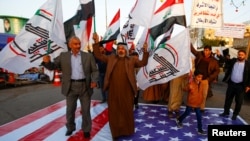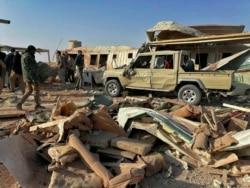Multiple Iraqi politicians condemned U.S. airstrikes on the pro-Iranian Shi'ite Kataib Hezbollah militia Sunday, which left 25 dead and over 50 wounded, according to Iraqi government TV. Local reports say the group is becoming increasingly unpopular with large segments of the Iraqi public. Iraq's Parliament met Monday to debate the U.S.'s action, but failed to muster a quorum.
Amateur video showed survivors of the U.S. airstrike on the pro-Iranian Kataib Hezbollah picking through the rubble and gathering the remains of victims killed in the strike Sunday. Iraqi government media reported that 25 people died, including three Iranian officers.
On social media, pro-Iranian Shiite groups spread photos of militia fighters killed in the raid, calling them martyrs.
Iraqi state TV read a list of political leaders who condemned the raid. The broadcast added that Sunni Parliament speaker Mohammed al-Halbousi was calling on all Iraqi forces to "use self-control" to avoid any escalation.
Meanwhile, the Iraqi Parliament met Monday afternoon, apparently aiming to condemn the airstrike. But a large number of MPs from Sunni, Kurdish and some Shi'ite political parties stayed away from the session, and no quorum was reached.
The head of the pro-Iranian Hezbollah militia hit by the air raid, Abu Mahdi al-Muhandis, vowed revenge, as militia fighters shouted approval.
Many Iraqi protesters who gathered in Baghdad's Tahrir Square, however, chanted slogans against Iran, which has become increasingly unpopular for meddling in Iraqi politics.
They chanted, "Iranians get out of Iraq," and "Free Baghdad."
Iraqi analyst Ahmed Shawki told Alhurra TV that pro-Iranian Shiite militias, including the Hezbollah group struck by U.S. warplanes Sunday, have become increasingly unpopular for their repression of popular protests.
He says that it has become clear to everyone since the protests began that the Shi'ite militias are under the command of Iran's supreme leader, and they have killed and maimed many demonstrators. Shi'ite militias, he adds, dominate the government, and no one dares to stop them.
U.S. Secretary of State Mike Pompeo told journalists that the U.S. airstrikes were a response for pro-Iranian Shiite militia attacks on U.S. forces.
"What we did was take a decisive response that makes clear what President Trump has said for months and months and months, which is that we will not stand for the Islamic Republic of Iran to take actions that put American men and women in jeopardy," he said.
A U.S. contractor was killed, and several others wounded several days ago, when Shiite militia fighters, reportedly from the Hezbollah militia group, fired rockets on the K-2 military base in Kirkuk. Pro-Iranian Shiite militia forces have also fired rockets or attacked U.S. forces at other Iraqi bases in recent months, including Balad, Taji, Ain al-Assad and Baghdad Airport, as well as the U.S. Embassy.





